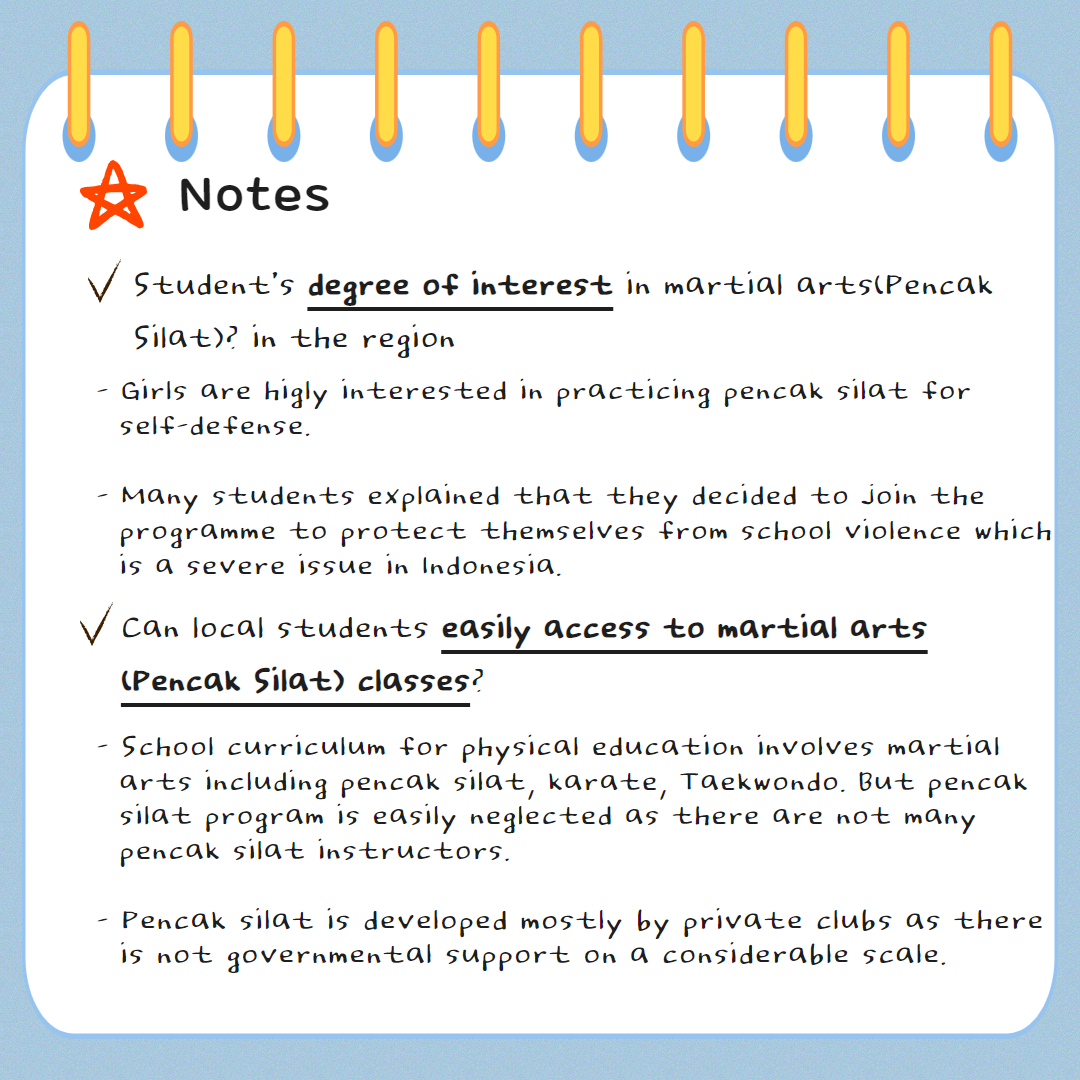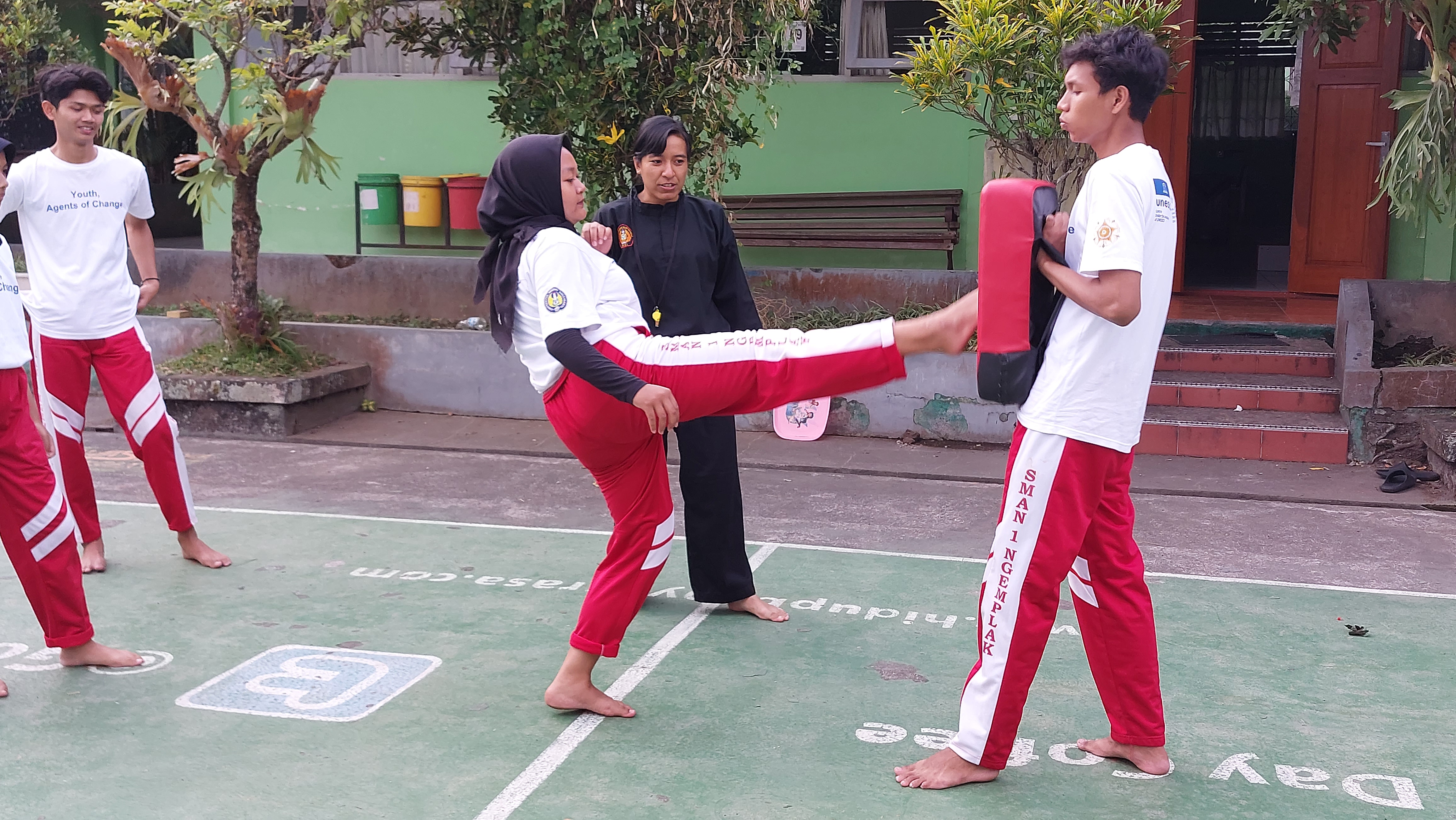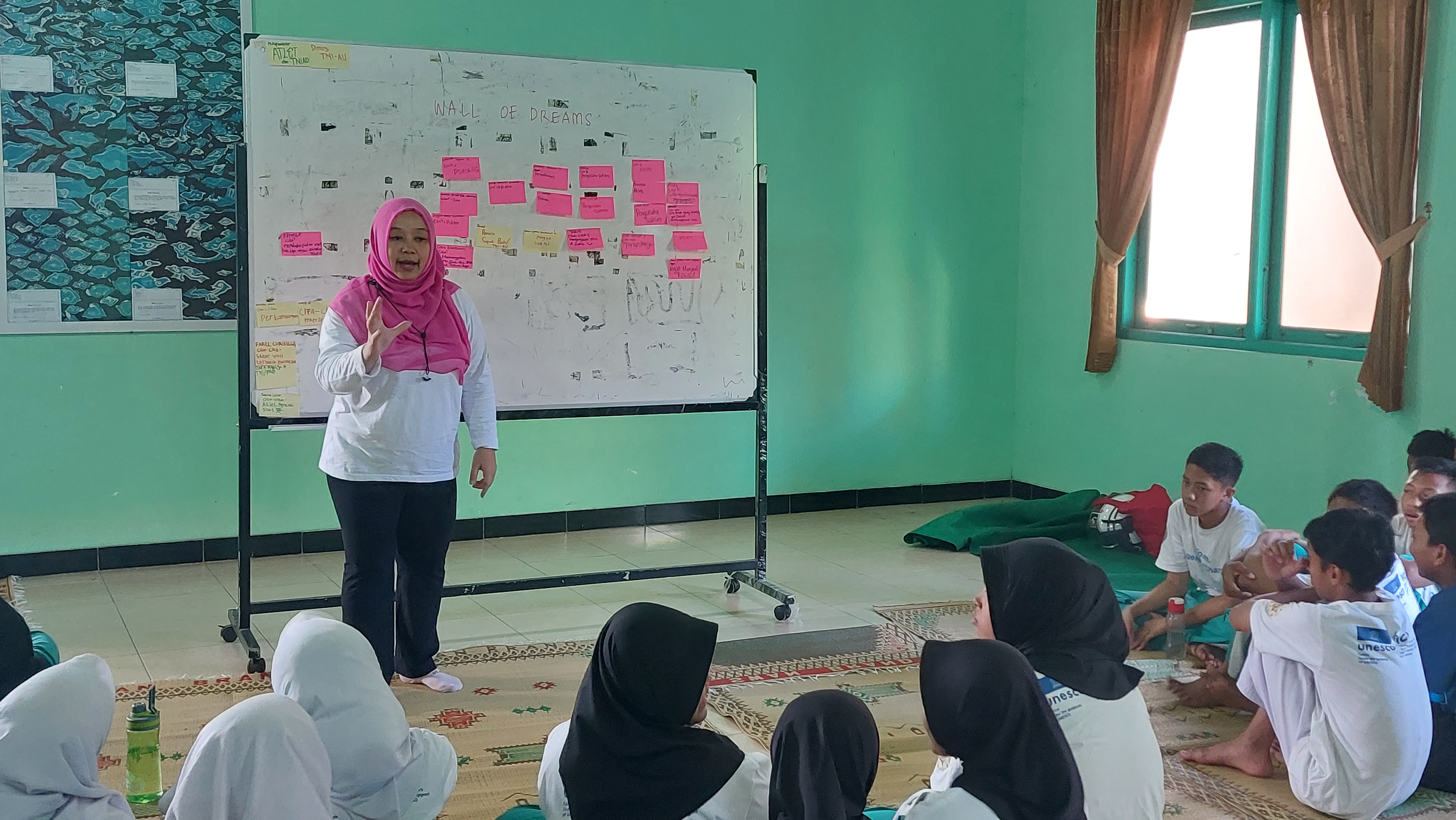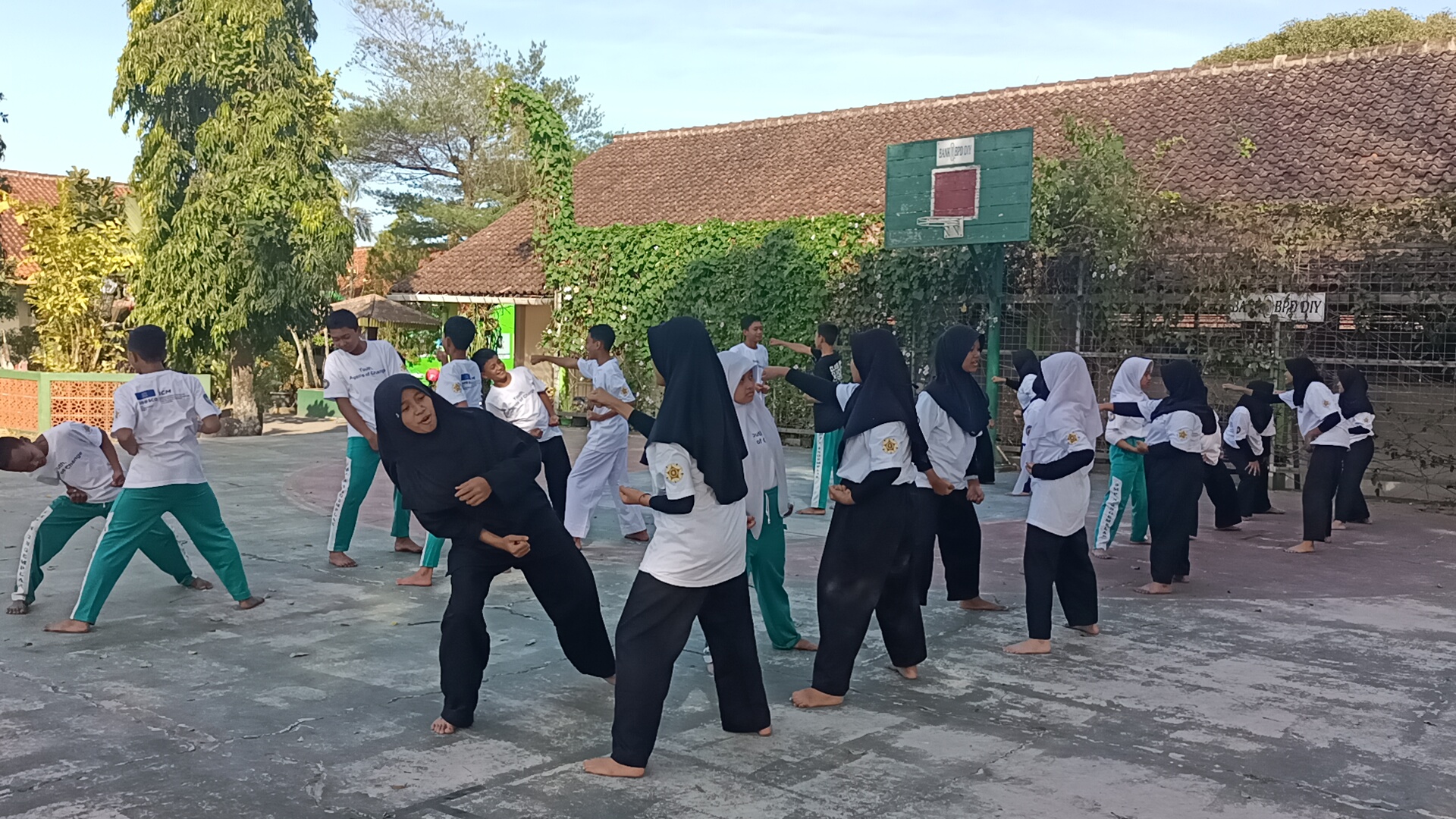Subscribe
Subscribe to our quarterly email newsletter 「ICM News」 to receive recent news about ICM, diverse writings by experts and youth, and relevant information.
Title [Centre News] Visiting the ICM Martial Arts Open School in Yogyakarta, Indonesia.

Visiting the ICM Martial Arts Open School - Yogyakarta, Indonesia(Aug. 27. ~ 31.)-
ICM visited the ICM Martial Arts Open School in Yogyakarta, Indonesia, which was held for three months, and had an interview with the participants including martial arts instructors and students. The program was operated in collaboration with Universitas Gadjah Mada (UGM), one of Indonesia's top universities, and Universitas Negeri Yogyakarta (UNY) specialized in physical education. About 100 elementary, Junior high, and Senior high school students practiced pencak silat, an Indonesian traditional martial art, for three months, from June 12 to September 25. The program, which was held twice a week for two hours a day, was composed of physical training and non-physical education including biweekly classes about gender equality and non-violence. The actual ratio of boys to girls in the program was one to one, but girls were more attentive, backed by the fact that the number of female applicants was higher than that of men. In fact, many young women in this region learn pencak silat to protect themselves. We had an interview with the instructors and students to find out what martial arts (pencak silat) training means to the participants and how to continue martial arts education in a sustainable way in the region. <Interview with the program instructors> We met three instructors from the ICM Martial Arts Open School in Indonesia.
From left, Master Dyah Purnama Sari, Kartini and Muhammad Wira Yudha Q1. What kind of values does pencak silat education provide for students? - Through pencak silat practice, students can learn religious, artistic, and spiritual values. Also, the program teaches adolescents how they should behave. Students learn how to defend themselves from others while also learning how to control themselves and appropriate attitudes toward their friends. Q2. How motivated and interested are the students? - Students are actively participating in the overall program, with an attendance rate of about 90%. The curriculum includes not only physical activities, but also non-physical classes and recreational programs where students can share their opinions and socialize. These aspects seem to have increased student participation. They are more focused and engaged when taught in their local language, Javanese. It is crucial to lead classes in the language students find comfortable to increase their participation. Many students have told me that they want to continue practicing pencak silat after the program, and there are some students who said they will keep practicing at private clubs. A few students with talent in pencak silat will be selected to receive training to prepare for local or national competitions. Q3. How do you measure their physical development level? Do you have a specific method for the test? - The program curriculum involves when and how to check students’ physical development. We are required to prepare classes on a weekly basis to promote their physical growth and martial arts skills. Two times of assessments are carried out in the form of exams to test their physical fitness on the first and last month of the whole program.
(photo) A girl practicing kicking - Some schools offer pencak silat classes as an after-school activity, and there are private pencak silat clubs in the region. Also, pencak silat is included in the regular curriculum for elementary school students. Generally, teachers choose one of the three options in the curriculum: Taekwondo, karate, and pencak silat. However, pencak silat is neglected in some cases since pencak silat is an option, not an obligatory course. Therefore, in most cases, students need to take pencak silat training as an extracurricular activity. Students who want to become a professional player or have talent are required to go through the selection process to receive education to prepare for local and national competitions. Q5. What are your wishes for this program? - I hope the ICM program helps students grow both physically and mentally. On the physical side, they can stay fit and healthy by practicing pencak silat and other martial arts continuously. On the other side, students can grow mentally based on time-management practice and a series of self-discipline while taking biweekly lessons about martial arts values including non-violence and gender equality.
(Photo) Students at theory class <Interview with three Martial Arts School Participants> 1. What made you participate in the Open Martial Arts School? Rukhmatun Nur Khasanah (Elementary School student): I previously participated at pencak silat club in my school when I was in second grade. However, my schedule was busy, and I ended up not being able to attend the practices. Luckily, when I was in third grade, there was a program from ICM. The trainer offered me this program, and I chose to join because I want to hone my skills in martial arts, especially gaining knowledge about pencak silat. I am happy because I participate in pencak silat training again.
Dimas Hadi Amrullah (Junior High School student): When I found out about this program, I decided to join it. I want a positive and fun activity during my free time after school. I also want to develop new knowledge I have never learned before. In addition, this program offers regular physical training twice weekly, which will make my body healthier. This is also my first outside-of-school program, so that it will increase my experience.
Kayla Fortunaya (Senior High School student): I want to know more about martial arts, but I have not yet the opportunity to take part in martial arts activities such as pencak silat. Therefore, when I found out about this program from my trainer, I was very interested in joining it. Luckily, she offered and asked if I wanted to join pencak silat training. I felt pleased and was curious and interested to try it even though I had never joined martial arts. This program will likely increase my knowledge about pencak silat.
(Photo) Students training Pencak Silat 2. What are the most satisfying things about the martial arts programme? Rukhmatun Nur Khasanah (Elementary School student): The satisfying thing about this program is that our trainers train us well, which is good. They also gave explanations that were easy to understand, so I learned a lot about pencak silat easily. Through this program, I also made many friends that I didn't know before, and they were very kind and fun. Dimas Hadi Amrullah (Junior High School student): The enjoyable things about this program are that I made many new friends and increased my physical exercise schedule, so I feel healthier than before. I was also satisfied with the materials because they were very detailed, so I could learn pencak silat step by step, even though there were some complex materials. Kayla Fortunaya (Senior High School student): This program has many satisfying things. The trainers are very friendly so we can learn pencak silat comfortably. I made lots of new friends. I also enjoy this program because I can visit new places to practice. In addition, this program also provides non-physical materials that emphasizes anti-violence and gender equality. We learned a lot about these two subjects, played games, and had many fun discussions. All of these things were very enjoyable for the participants. (Photo) Students doing sit-ups 3. Any positive comments regarding the programme or martial arts activities? Rukhmatun Nur Khasanah (Elementary School student): This is a very good program. I am pleased to get this opportunity. Through this program, I gained new knowledge about pencak silat, such as the various movements, how to do each movement, the correct body position, and so on. I also gained new experiences and finally made many friends. Dimas Hadi Amrullah (Junior High School student): This program is excellent because it has various positive impacts. This activity gave me much new knowledge about pencak silat. Then, my physical performance is better, and my body is healthier than before. Besides, this program also improves participants' personalities because it teaches them to be disciplined and responsible.
Kayla Fortunaya (Senior High School student): This program is beneficial because it increases physical and non-physical abilities. From the physical perspective, the participants understood how to defend themselves in correct way without hurting their opponents. We also improved physical skills because there is a regular weekly practice schedule. From the non-physical perspective, the participants' time management skills, discipline, and responsibilities increased. |






















